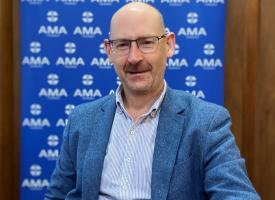Dr Bartone - ABC News Breakfast - Coronavirus
Transcript: AMA President, Dr Tony Bartone, ABC News Breakfast, Monday, 2 March 2020
Subject: Coronavirus
LISA MILLAR: Well, in preparation for a major coronavirus outbreak, health authorities in Queensland are bringing forward elective surgeries to free up space in the State's hospitals. So, how well prepared is our health system? We're joined now by the President of the Australian Medical Association, Dr Tony Bartone. Good morning to you, Tony.
TONY BARTONE: Good morning.
LISA MILLAR: So, we've heard so far that Queensland is bringing forward these elective surgeries. Are other States doing that and, if not, should they be doing that?
TONY BARTONE: As you know, on Friday, the State Health Ministers were meeting here in Melbourne and these are obviously some of the issues that they were discussing – the ability to deal with the expected increase in demand on our hospitals. This process in Queensland, or this plan, is a good one to look at in trying to clear up as much of the backlog in elective surgery because, obviously, when our resources are diverted to deal with the expected increase in demand from the coronavirus and COVID-19, clearly, elective surgery will have to take a second order priority. But, it does point to the pent-up demand in the system already.
So really, this is a good short-term measure, but it really points to other measures needed in the long term to deal with these issues.
MICHAEL ROWLAND: And I guess, particularly, if the worst-case scenario, coronavirus sticks with us for some time, Tony, and putting increased pressure on those already stretched public hospital systems?
TONY BARTONE: That's right. Clearly, there's a lot of modelling being done about how quickly it will or won't spread through a community. In that process, what might happen, if it is that until a vaccine fully comes through, we really won't have any other first line defence other than basic hygiene and prevention of trying to contain its spread. So, in the meantime, yes, we really have to be very vigilant and aware of what goes on.
LISA MILLAR: Okay. So, let's get some practical suggestions from you then. So, washing hands, basic hygiene, not touching your face.
TONY BARTONE: Correct.
LISA MILLAR: Do people need to wear masks?
TONY BARTONE: No. Absolutely not. The only people who do need to wear masks are those who actually suspect cases while they're being cared for or treated or in self-isolation, if with other people. But clearly, there's no real benefit to wearing a mask in the general population. That's really wasting very precious resources, especially if we get into extensive spread for a community.
MICHAEL ROWLAND: Some of the other bits of misinformation - congregating in public places; avoiding cities and the like?
TONY BARTONE: That- you know, in the first phases, that's clearly not really part of the advice. Once we get to, you know, if there was a complete breakdown in the systems and the spread's ubiquitous, well then, potentially, that might be the thing to do. But at this stage, avoiding public places is really not a sensible …
MICHAEL ROWLAND: [Interrupts] And as part of that, sadly, we're seeing Chinese restaurants struggling - either going out of business or being empty. People, again, wrongly, avoiding the Chinatowns, the Chinese restaurants in Australia?
TONY BARTONE: And that's absolutely correct. There's no basis for that. That's really very, very, very sad for those businesses who are really going to be put under pressure for no good reason other than misinformation and fear.
LISA MILLAR: Tony, can I just ask you about the travel restrictions. China, Iran - what about Italy?
TONY BARTONE: Well the …
LISA MILLAR: [Interrupts] Where there is no travel restrictions. It should be clear at this point in time.
TONY BARTONE: My information is that, as of this morning now, those restrictions to Italy are now to level three, which is the second highest restriction to the northern Italian towns, those 12 northern Italian towns in Lombardy and Veneto. But the rest of Italy is now level two restriction.
LISA MILLAR: But what about coming here? Italians coming- oh sorry, no, I shouldn't say Italians- people returning from Italy?
TONY BARTONE: So that's one of the processes in this whole thing is having faith in the reciprocating country's health service, and knowing that those people are going to be screened before they get on to the flight, have the information should they get sick to seek attention, that if they are coming here and they're not Australian citizens, they might be required to be quarantined or sent back if things worsen.
LISA MILLAR: Right. But you don't think that there's time for a travel ban at this stage?
TONY BARTONE: At this stage, no, it's now in excess of 60 countries. As it becomes more, you know, commonplace right through all the rest of the world, travel restrictions are not really an effective measure.
LISA MILLAR: Okay. Alright. Tony, well look, thank you so much for all of those practical ideas and the main message is wash your hands, keep going about your daily business.
TONY BARTONE: Practise basic, simple hygiene measures and keep well.
LISA MILLAR: Okay. Alright. Thanks very much, Tony Bartone.
2 March 2020
CONTACT: John Flannery 02 6270 5477 / 0419 494 761
Maria Hawthorne 02 6270 5478 / 0427 209 753



